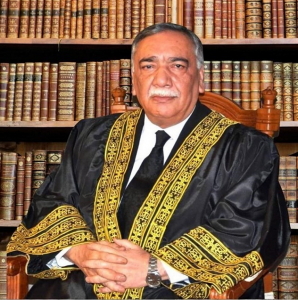Model Courts
A Silent Revolution
Magazine Desk
The reforms in the legal system of Pakistan have been long debated due to great backlog of cases which is preventing the smooth functioning of the judicial system. This backlog has increasingly pushed the masses to move towards alternative means of justice which are speedy, if not efficient. However, in this bleak state of affairs, Chief Justice of Pakistan, Justice Asif Saeed Khan Khosa, came in with the promise of resolving this issue and introducing reforms which will be able to garner a real change in the society. In order to ensure expeditious justice, he launched, in March this year, the “Expeditious Delivery Initiative -I” under which 110 Model Criminal Trial Courts (MCTCs) were set up across the country with the mandate to decide pending murder and narcotics cases in accordance with a stipulated schedule.
Article 37 (d) of the Constitution of Pakistan, 1973, guarantees that every citizen of the state has the right to “inexpensive and expeditious” justice, yet one of the foremost grievances against the legal system in the country is its sheer lethargy, resulting in a massive backlog of cases. At the beginning of the year, there were an estimated 1.9m cases pending in the country’s courts. In this backdrop, the incumbent chief Justice of Pakistan, Asif Saeed Khan Khosa, proposed the setting up of model courts in every district of the country to conduct daily trials. The setting up of model courts has proved to be a very fruitful exercise.
 Although the success of model courts set up by the CJP has not been publicised by the media, they are being considered a ‘silent revolution’ in the judicial history of Pakistan. Basic objective behind establishing Model Courts was to provide inexpensive and expeditious justice to the masses. An idea of the performance of these courts can be had from a statement by the incumbent Chief justice where he said that as many as 5800 trials were decided through model courts in 48 working days. This is indeed a stellar performance. Bringing down the processing time of a criminal case from 4-5 years to 3 months is quite an impressive feat and the CJP must be commended for this.
Although the success of model courts set up by the CJP has not been publicised by the media, they are being considered a ‘silent revolution’ in the judicial history of Pakistan. Basic objective behind establishing Model Courts was to provide inexpensive and expeditious justice to the masses. An idea of the performance of these courts can be had from a statement by the incumbent Chief justice where he said that as many as 5800 trials were decided through model courts in 48 working days. This is indeed a stellar performance. Bringing down the processing time of a criminal case from 4-5 years to 3 months is quite an impressive feat and the CJP must be commended for this.
The timelines prescribed under existing rules of civil and criminal procedures, often flouted by litigants and judicial officers alike, have in the past largely proved insignificant in addressing the problem of delay. However, with a zero tolerance policy for adjournments and procedures in place to ensure timely production of witnesses, the MCTCs have, quite surprisingly, decided over 5,000 cases within a period of two and a half months. The figures furnish some hope that with appropriate interventions, the judicial system in Pakistan may be mended.
The judges appointed for these courts ensure a speedy trial and also prefer to take a case per day and move towards resolution. Due to the involvement of multiple stakeholders in the process, it has become quite efficient to tackle a case a day.
Encouraged by the success of the initiative, the CJP decided to replicate the model on the civil side. He recently announced the establishment of Model Civil Appellate Courts and Model Trial Magistrate Courts, which shall also operate on strict timelines, and through the adoption of certain pre-trial procedures shorten the duration of trials.
 Jahangir's World Times First Comprehensive Magazine for students/teachers of competitive exams and general readers as well.
Jahangir's World Times First Comprehensive Magazine for students/teachers of competitive exams and general readers as well.



